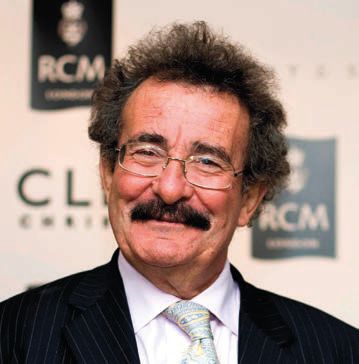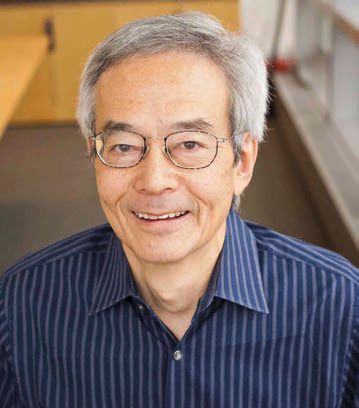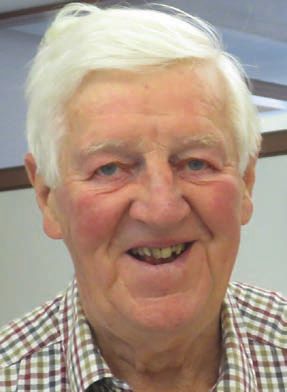
Physiology News Magazine
Physiology 2014: An insider’s view
Events
Physiology 2014: An insider’s view
Events
Robert Winston
Imperial College London, UK
Richard Tsien
New York University, US
Peter Sleight
University of Oxford, UK
https://doi.org/10.36866/pn.95.22
Ahead of The Society’s annual conference in London, Physiology 2014 (P14), PN gets the inside scoop from three of our prize lecturers. We find out about the hot topics they will be presenting and what else they are looking forward to in the diverse and exciting programme.
Annual Public Lecture: Shall we be human in the next century?
1 July | 18.15–19.15

What is the purpose of meetings like P14?
Science is no longer a series of silos of biology, physics, chemistry, mathematics and engineering: they are all blurred. That is of course why meetings are valuable – you share, and see the interfaces between what have been separate subjects in the past. You see how they work and interact together and that’s important.
Also, I think to get more science engagement is an important thing for our society – it has to be something which is of increasing necessity if people are to control the science which is done for them by other people that think they know better!
What can we look forward to hearing from you in your public lecture?
The issue really is that humans, ever since the beginning of time – or before historical time – have manipulated their own evolution. They did so by producing technology, like the hand axe, which of course has impacted the modern human brain. So really what I’m going to be arguing is that we are possibly now in the position to manipulate our evolution again using molecular biology. The question I will be proposing is whether this is a good thing or a bad thing. And what we might find are some of the issues involved in genetics of this kind, and where the pitfalls are.
Why do you think it’s important to highlight this topic to the general public?
The topic that’s important is how we handle our technology and it is significant to everybody. What is crucial is that, in an age which is increasingly driven by science, we ensure that people are as literate as possible about the science that has been done in their name. So that in a democracy they can have some control over it.
A-level students will present research projects at Physiology 2014. What advice would you give to students that may consider a career in research?
Remember that science is full of impossible role models. We are taught again and again of the great scientists: the Darwins and the Einsteins and the Newtons. Actually, science isn’t really like that. The great names really are unimportant and real science is not done by those people. Real science can be done by these students – the next generation – because science essentially is not a difficult pursuit. People like myself are not geniuses, we are very ordinary and how we achieve the science that we do is by collaboration with a group of people. We work together, rather like a termite mound: each termite has a pinhead of a brain, but actually working collectively they can make a 10-foot edifice which is full of tunnels and air conditioning! So I think it’s important for young people to understand that actually if they’re really interested in science, they can do it and they can do it to a very high level.
Annual Review Prize Lecture: Excitation–transcription coupling: Novel mechanisms and implications for brain disease
30 June | 18.00–19.00

What do you feel is the purpose of meetings like P14?
Meetings like this one – the programme looks superb – serve several important functions. Scientific interchange in our own fields and in areas we didn’t realize we needed to know about. Socializing; making new, sometimes lifelong friends. I vividly remember Denis Noble telling me about his first physiology congress, in Leiden, around 1960.
What can we look forward to hearing about in your lecture?
I will speak about how neuronal firing is linked to the expression of genes. We have found a new mechanism for sending signals from the surface of excitable cells to their nucleus – an express package for calcium/calmodulin. It’s important to highlight this topic because excitation–transcription (E-T) coupling is universal to excitable cells but much less understood than excitation-secretion coupling (think Bernard Katz) and excitation–contraction coupling (think Alan Hodgkin and Andrew Huxley, working independently). All cells have genes to regulate, and dysfunction of E-T coupling may lead to diseases of the brain.
What are the latest developments in this field?
There is an upwelling of discovery about new players in the regulation of signalling from synapse or surface to nucleus, from multiple groups. We are also seeing calcium signalling, so important for non-excitable as well as excitable cells, in a new light.
Which other symposia and workshops stand out to you at P14?
Well, everyone will have their own picks, but I like:
- Coupling cellular metabolism to neuronal signalling
- Physiology meets clinic: From bench to bedside and from bed to benchside
- The heart is lost without the brain: The autonomic perspective
Of course, the reverse is also true! - The axon initial segment, a plastic gatekeeper for neuronal activity
Get into outreach: Practical advice from Society grant success stories
This is something we’re very keen on here in NYC under the leadership of two Heathers (http://comebebrainy.com/brainy-blogs).
Finding the hook in your research
What advice would you give to students presenting posters at P14?
Make sure your most important points are stated clearly and simply at the beginning and, in different words, at the end. Work hard on reaching a broad audience, both for its own sake as well as career advancement. Be open to branching out into areas you were never trained in.
Paton Prize Lecture: A historical perspective on reflex cardiovascular control in man
2 July | 11.15–12.15

What do you feel is the purpose of meetings like Physiology 2014?
For young people, it’s an opportunity to put faces to names and make contacts with other people who are working in the same field. For older people, it’s fun to meet old friends and chew the fat and discuss things. It’s a sort of club really. You undoubtedly get new things out of it – you can’t always take in everything that happens, but you can hear what people think.
What can we look forward to hearing about in your lecture?
It’s about the history of the baroreceptor control of blood pressure. It’s quite an interesting time because of new developments in treating hypertension. The problem with drug treatment for hypertension is that we have a lot of choices – they are very effective, but people don’t stick with it – the flower beds outside hospital wards are full of pills! For some people in other countries, the price of drug treatments is a big burden. Treatment with cardiac pacemakers, supplied to the carotid sinus nerve, has now become a real practical proposition and a very good alternative to drugs.
What are the latest developments in this field?
The hot topic is renal denervation, where you pass a catheter up from the groin and burn the inside of the renal arteries carefully. That destroys the sympathetic nerves of the kidney and has been touted as a very simple and effective treatment – even better thana pacemaker. This has become very popular and they estimate something like 10,000 people have had that treatment. But the problem is that the American Food and Drug Administration were not going to licensethis treatment without a better trial. It was double blind – the patients all had a catheter but didn’t know if their renal nerves had been denervated. This trial has reported recently (called ‘SYMPLICITY 3’) and it proved negative, which has raised a lot of questions and has put it on hold. They found that black participants in fact had increased blood pressure, which did not occur in white patients. So it’s now a very interesting topic, and I’ll be talking about that and what needs to happen next. It’s not dead, but it’s certainly stunned!
Which other symposia and workshops stand out to you at P14?
The heart is lost without the brain: The autonomic perspective
It’s an interesting area; we’re learning much more about how the brain works and how it affects cardiac-related things.
Co-morbidities associated with the sleep apnoea syndrome and their mechanisms
I spent seven terrible years of my life studying sleep! Intelligent people study sleep in animals like cats that sleep during the day and it doesn’t disturb your sleep – but I spent seven years or more studying sleep in man, where I lost a lot of sleep myself!
Effective Presentation Skills
I just think this is very important for everyone in their career.
Statistics: the Emperor’s clothes
If you’re doing research, you’ve got to understand statistics. Even if you’re looking at published papers, you’ve got to understand statistics. I’m not great on it – I must have been to three courses in my life but if I need any statistics on my own papers, I go and ask somebody else!
A-level students will present research projects at Physiology 2014. What advice would you give to students that may consider a career in research?
The main thing when you consider your career is to do something you’re going to enjoy. Physiology is something that people will really enjoy. It’s a tough field because, when you’re young, getting grants isn’t easy. But if you are successful and get grants, I can guarantee you’re going to have an interesting life!
